|
|
|
Sort Order |
|
|
|
Items / Page
|
|
|
|
|
|
|
| Srl | Item |
| 1 |
ID:
139619
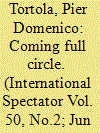

|
|
|
|
|
| Summary/Abstract |
Europe’s woes mark a new chapter in the longstanding theory/history nexus in European studies. The euro crisis has brought integration theory back onto the scholarly agenda and highlighted the value of neo-functionalism – and more precisely its key ‘spillover’ mechanism – as a framework for interpreting current politico-institutional dynamics in the European Union. We are, however, at a particular point of the neo-functionalist narration, in which the transition from low to high political integration has opened a phase of political fluidity that makes ideas and political leadership crucial in determining the future course of integration. In this phase, the positive scheme of neo-functionalism and the normative one of federalism come together, bringing the intellectual trajectory begun after WWII to full circle. Whether this new encounter will result in further integration depends primarily on the content of new federalist ideas, the emergence of an effective European leadership, and the presence of a favourable international environment. For all three factors, the record so far has been mixed at best.
|
|
|
|
|
|
|
|
|
|
|
|
|
|
|
|
| 2 |
ID:
143023
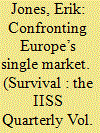

|
|
|
|
|
| Summary/Abstract |
In launching a renegotiation of the terms of British membership, and thereby declaring the current settlement to be inadequate, Prime Minister David Cameron has contrived to make a confusing case for the United Kingdom remaining part of the European Union. His task is made more difficult by the fact that – like many other supporters of the EU – he is selling a vision of Europe that misrepresents both the EU’s weaknesses and its greatest strength.
|
|
|
|
|
|
|
|
|
|
|
|
|
|
|
|
| 3 |
ID:
118279
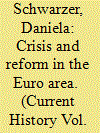

|
|
|
|
|
| Publication |
2013.
|
| Summary/Abstract |
A major challenge for policy makers lies in the fact that they may have to move forward with a deepening of integration at a time when the EU and the euro area confront a growing crisis of acceptability.
|
|
|
|
|
|
|
|
|
|
|
|
|
|
|
|
| 4 |
ID:
141114
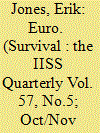

|
|
|
|
|
| Summary/Abstract |
Europe’s monetary union changed fundamentally on 10 July 2015, when German Finance Minister Wolfgang Schäuble tabled a proposal for Greece to leave the euro, temporarily, while it sorted out its public finances and other related economic reforms.1 Until that moment, Europe’s monetary union had been a system of irreversibly fixed exchange rates. Once this proposal was made – by the powerful finance minister of the only country capable of carrying out the threat – membership of Europe’s fixed-exchange-rate regime became conditional. The euro is still a shared multinational currency with a common European Central Bank (ECB), and the European Union (EU) retains its institutions for coordinating macroeconomic policy across the eurozone. Nevertheless, the shift from ‘irreversible’ to ‘conditional’ was important.
|
|
|
|
|
|
|
|
|
|
|
|
|
|
|
|
| 5 |
ID:
116641
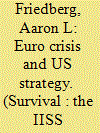

|
|
|
|
|
| Publication |
2012.
|
| Summary/Abstract |
For 45 years after the end of the Second World War, American strategists worried far more about Europe's perceived political, economic and military weakness than they did about its potential strength. Following the fall of the Berlin Wall and the end of the Cold War this pattern was briefly reversed. With the signing of the Treaty of Maastricht in 1992 the birth of a 'United States of Europe' seemed finally to be at hand. Possessed of a vast market and nascent institutions of central governance, this new entity was widely seen as having the potential to become a major player on the world stage.
|
|
|
|
|
|
|
|
|
|
|
|
|
|
|
|
| 6 |
ID:
121572
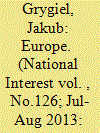

|
|
|
|
|
| Publication |
2013.
|
| Summary/Abstract |
THE EUROPEAN Union's unfolding crisis tends to be seen as purely economic in nature and consequence. The EU is a common market, with a common currency adopted by most of its members and with fiscal problems of one kind or another facing almost all of its capitals. Most analyses of the euro crisis focus, therefore, on the economic and financial impact of whatever "euro exit" may occur or of a European fiscal centralization. In the worst case, they project a full-fledged breakup of the common currency and perhaps even the EU itself. Not much can be added to this sea of analysis except a pinch of skepticism: nobody really knows the full economic impact, positive or negative, of such potential developments. In fact, not even European leaders seem to have a clear idea of how to mitigate the economic and political morass of the Continent. While it is certain that the EU of the future will be different, it isn't clear just how.
|
|
|
|
|
|
|
|
|
|
|
|
|
|
|
|
| 7 |
ID:
102788
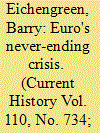

|
|
|
|
|
| Publication |
2011.
|
| Summary/Abstract |
The fact that resolving the crisis will be costly has one silver lining. It concentrates attention on the need to reform the institutions of the euro area to prevent equally costly crises from occurring again
|
|
|
|
|
|
|
|
|
|
|
|
|
|
|
|
| 8 |
ID:
115079


|
|
|
|
|
| Publication |
2012.
|
| Summary/Abstract |
Lazy, profligate, scheming Greeks versus honest, thrifty, industrious Germans. Southern vice versus northern virtue.
For much of the news media-not only in continental Europe's "virtuous" north, but also in the United States-the euro sovereign debt crisis could be summarized in the form of this morality play opposing national or regional stereotypes. If in Germany itself it was the deliberately over-the-top tabloid Bild that famously took the lead in lecturing the Greeks on Greek vice and German virtue, in the United States, New York Times columnist Thomas Friedman adopted essentially the same tone and underlying "analysis." "Can Greeks Become Germans?" Friedman asked in a column written last year, suggesting that this was the only way the crisis could be resolved. Even the acronym commonly employed for southern Europe's fiscal "sinners" reflects moral opprobrium and contempt: the "PIGS" (sometimes written "PIIGS," so as to include also the northern European special case, Ireland, along with Portugal, Italy, Greece, and Spain).
|
|
|
|
|
|
|
|
|
|
|
|
|
|
|
|
| 9 |
ID:
157498


|
|
|
|
|
| Summary/Abstract |
After the global financial crisis, economists have been downbeat about the growth prospects of the capitalist world economy, leading many to argue that we have re-entered a period of “secular stagnation”. The phenomenon of secular stagnation is intrinsically connected to the evolution of global macroeconomic imbalances. During the pre-crisis era of the “Great Moderation”, the widening of global and European trade imbalances temporarily alleviated the problem of secular stagnation by forging a symbiotic yet unsustainable relationship between debt-financed consumption-led growth models in deficit countries and export-led growth models in surplus countries. The re-surfacing of secular stagnation and the asymmetric adjustment of these imbalances after the crisis can both be traced back to the domestic political constraints experienced by many advanced market economies in trying to revive their pre-crisis growth models.
|
|
|
|
|
|
|
|
|
|
|
|
|
|
|
|
| 10 |
ID:
118082


|
|
|
| 11 |
ID:
153933


|
|
|
|
|
| Summary/Abstract |
The 2008 financial crisis hit few places harder than the Euro periphery. Faced with high levels of public debt, Portugal, Italy, Ireland, Greece, and Spain were each compelled to implement harsh austerity reforms. Yet despite this common policy response, the recoveries have shown significant divergence. In particular, Ireland seems to have managed to succeed economically in a way that the other peripheral countries have not. The prevailing narrative is that Ireland’s recovery from the crisis is due to “austerity” and improved “cost competitiveness.” Drawing upon theories from the study of comparative capitalism we challenge this narrative, and argue that the Irish recovery is an outcome of a state-led enterprise policy aimed at nurturing a close relationship with corporate firms from Silicon Valley. Using qualitative and quantitative investigation we find evidence that this state-led FDI growth model, rather than austerity induced competitiveness, kick-started Ireland’s recovery from crisis. As Ireland is a critical case for the “success” story of austerity in Europe, our findings represent a significant challenge to the politics of adjustment. It suggests the strategies of business-state elites, and not simply the workings of electoral coalitions, explains the politics of adjustment in advanced capitalism.
|
|
|
|
|
|
|
|
|
|
|
|
|
|
|
|
| 12 |
ID:
142902


|
|
|
|
|
| Summary/Abstract |
The article by Robert Mundell, written on the eve of the establishment of the euro in May 1998, inevitably reflects his very optimistic and enthusiastic assessment of an event that seemed to confirm his own views about the evolution of the international monetary system. Mundell had in fact pioneered, already in the 1960s, analysis of the impact of monetary and fiscal policies in different exchange rate regimes, as well as analysis of “optimum currency areas”. When he was awarded the Nobel Prize in Economic Sciences in December 1999 for these very contributions to international economics, the media reported that the prize had been given to “the father of the euro”.
|
|
|
|
|
|
|
|
|
|
|
|
|
|
|
|
| 13 |
ID:
116616


|
|
|
|
|
| Publication |
2012.
|
| Summary/Abstract |
Europe's Golden Age-an unprecedented period of peace, social stability, and prosperity that followed World War II-may be coming to an end. The very foundations of the European edifice have trembled at times in the last two years; even now, a worst-case scenario of collapse of the European project is not impossible. But if, as expected, Europe as we know it muddles through the Eurocrisis, it will not be the same. It will not be as happy and peaceful a place as before. In hindsight, the European settlement after World War II may not have constituted the beginning of a new European epoch, but a particularly auspicious chapter that is now closing. What remains to be seen is what might take its place. History is returning to Europe.
|
|
|
|
|
|
|
|
|
|
|
|
|
|
|
|
| 14 |
ID:
127172


|
|
|
| 15 |
ID:
117705
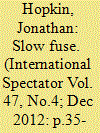

|
|
|
|
|
| Publication |
2012.
|
| Summary/Abstract |
Italy is firmly in the grip of an austerity programme mandated by the European Union institutions, and executed by an unelected technocrat. This state of affairs is at once the result of the acute and unexpected crisis of the financial and economic integration of the eurozone, and an expression of the failures of the Italian political class. Although the euro crisis has been mishandled by European elites, Italy's long-term economic decline, and the inability of Italian party politicians to generate a sustainable coalition to address Italy's economic problems, hinders an exit from the crisis.
|
|
|
|
|
|
|
|
|
|
|
|
|
|
|
|
| 16 |
ID:
111545


|
|
|
|
|
| Publication |
2012.
|
| Summary/Abstract |
This article considers the likely impact of the global crisis on the prospects for the European project. First, it considers the nature of the current crisis. It argues that it is comparable, in terms of its deep structural character, to the one in the 1930s. The crisis manifested itself first in the financial sector, but was caused by underlying problems of overaccumulation, which explains the succession of speculative booms and busts from the 1980s onward. The article then analyses how the financial crisis transmuted into the current sovereign debt crisis in Europe. It identifies a number of interdependent factors responsible for this: the bailouts of banks following the credit crisis; the stimulus programmes necessitated by the danger of a deep economic recession; the structural problems of the European Monetary Union leading to the accumulation of debt in the peripheral members; and finally the catalytic action of speculation in the financial markets. Finally, the article discusses responses to the debt crisis, outlining the contours of two alternatives (muddling through and Europeanisation), their implications, and some of the conditions for success. The conclusion is rather pessimistic: chances that an effective, timely and sustainable solution will be realised do not seem high.
|
|
|
|
|
|
|
|
|
|
|
|
|
|
|
|
| 17 |
ID:
120776


|
|
|
|
|
| Publication |
2013.
|
| Summary/Abstract |
Three earthquakes have shaken the main pillars of the global system - security, economy and politics - over the past two decades. The foreign policy Turkey has pursued throughout these three major earthquakes draws on principles that are in line with the challenges of the enormous transformations underway. The fall of the Berlin Wall, 9/11 and, most recently, the Arab Spring and the euro crisis have had tremendous implications for the international order. With its international position and historical depth, Turkey has shown that it has the potential to contribute to the transformation of the international system, and it will continue to maintain its determined stance in the future.
|
|
|
|
|
|
|
|
|
|
|
|
|
|
|
|
|
|
|
|
|